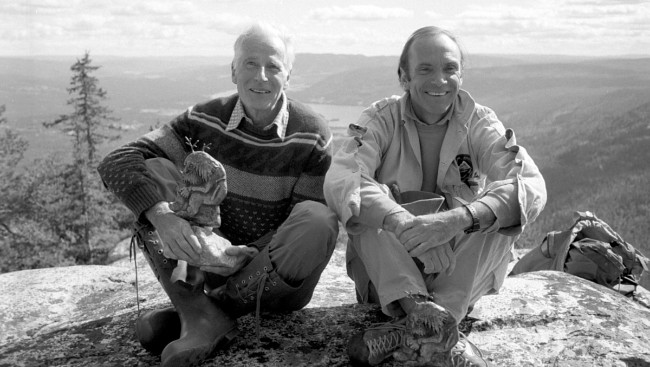What is Deep Ecology?
As George Sessions points out in the preface to the book he edited, Deep Ecology for the 21st Century, “The Long-Range Deep Ecology movement emerged more or less spontaneously and informally as a philosophical and scientific social/political movement during the so-called Ecological Revolution of the 1960s. Its main concern has been to bring about a major paradigm shift- a shift in perception, values and lifestyles- as a basis for redirecting the ecologically destructive path of modern industrial growth societies. Since the 1960s, the long-range Deep Ecology movement has been characterized philosophically by a move from anthropocentrism to ecocentrism, and by environmental activism.”

Arnes Naess Jr. with his uncle, Arne Naess Sr. on top of Andersnatten, Norway – Photo Bjorn-Owe Holmberg
During the 1970s, Norwegian philosopher and mountaineer Arne Naess began to delineate the differences in what he saw as the emerging Deep Ecology movement and that of an established, anthropocentric-based “human survival environmentalism” (shallow ecology) to a burgeoning environmental community.
He described shallow ecology as short-term thinking and shallow actions to address environmental issues without fundamentally changing our values or the way we live. This includes actions like recycling, driving electric vehicles, and buying energy efficient consumer products. While these approaches do some good, they allow us to continue with our human centric, fossil fuel dependent, consumer oriented lifestyles with little inconvenience to ourselves and not much thought to all the other living things on Earth.
Deep Ecology recognizes the inherent value of all living beings. It involves deep questioning and acknowledging that tweaking our “business as usual” approach is not working. Global climate change, collapse of biodiversity, the extinction crisis, environmental degradation, and overpopulation are enormous problems. Deep ecology requires us to change our basic values and practices; to use a long-range deep approach to addressing environmental issues and preserving the diversity and beauty of the Earth we all rely on for life.
Arne Naess created a set of eight principles to characterize the deep ecology platform.
